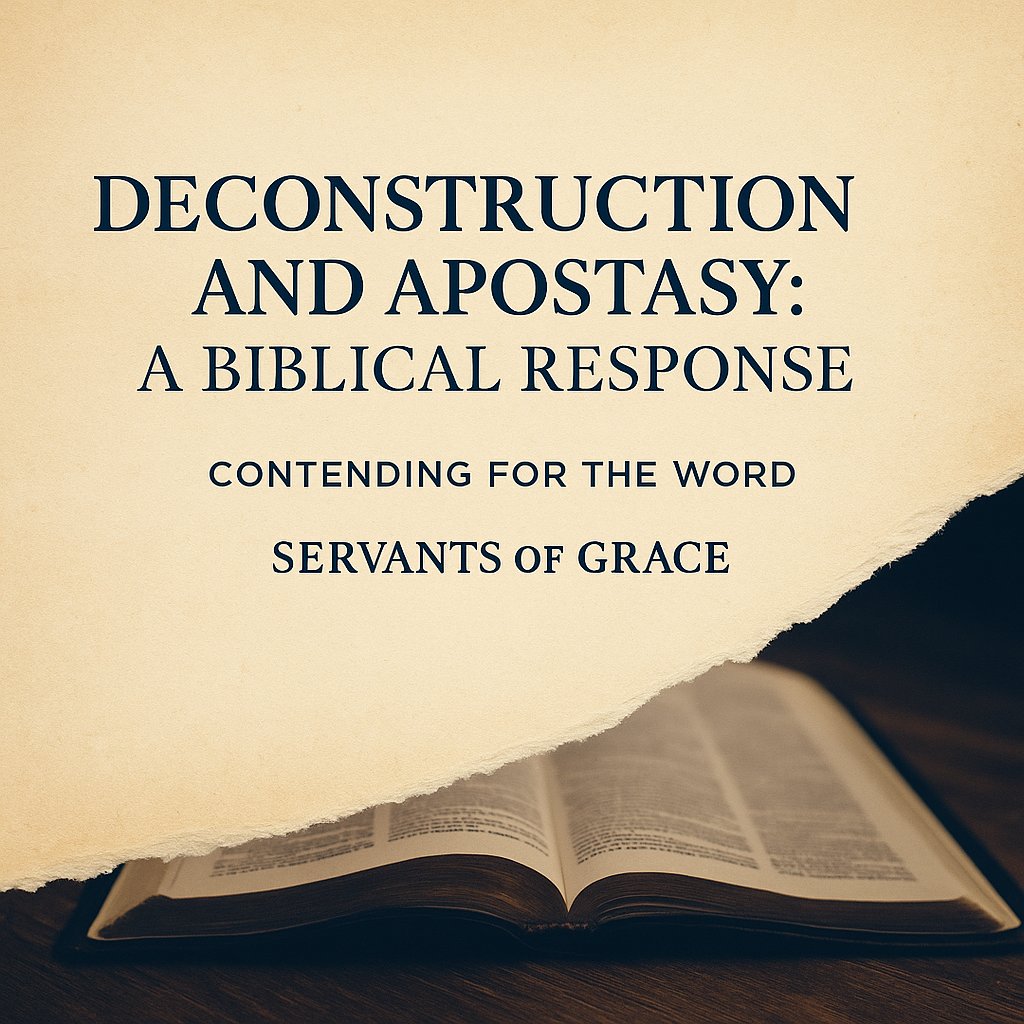⏱️ Estimated Reading Time: 3 min read
Deconstruction and Apostasy: A Biblical Response
Contending for the Word – August 22, 2025
Written by Dave Jenkins
The Question
Is “Christian Deconstruction” just a new form of apostasy?
Introduction
“Deconstruction” has become a buzzword in evangelical circles, often used by those who say they are reexamining their faith. For some, that process begins with honest questions. Yet far too often it ends in rejecting core doctrines, abandoning biblical authority, and walking away from the local church. When deconstruction denies Christ, rejects Scripture, or embraces false teaching, we’re not witnessing spiritual maturity—we’re witnessing rebellion.
Defining Terms: What Is Deconstruction?
At its most charitable, deconstruction can mean testing traditions by Scripture—something every believer should do (cf. Acts 17:11). But in common use it frequently becomes a self-directed dismantling of the faith where personal experience sits in judgment over God’s Word. The former leads to reform and renewal; the latter leads to erosion and unbelief.
What the Bible Calls Apostasy
Scripture is plain: when someone departs from the faith and no longer walks in obedience to Christ, that departure is apostasy. “The Spirit expressly says that in later times some will depart from the faith” (1 Timothy 4:1). Jude warns of those who “creep in unnoticed” and distort grace into lawlessness (Jude 4). And the writer to the Hebrews exhorts us, “Take care… lest there be in any of you an evil, unbelieving heart, leading you to fall away from the living God” (Hebrews 3:12). Deconstruction that leads away from Christ is not a return to truth but a rejection of it.
Honest Doubt vs. Willful Rebellion
There is a difference between the wounded and the wandering. Jude instructs the church, “Have mercy on those who doubt” (Jude 22). Questions, struggles, and seasons of confusion are real and require patient, biblical care. But there is a line between seeking clarity in Christ and seeking freedom from Christ. The first sits humbly under Scripture; the second stands pridefully over it.
Popular Voices Leading Many Astray
Today, prominent “exvangelical” platforms commend progressive Christianity, universalism, and moral relativism. These frameworks replace submission to Christ with submission to self, scratching “itching ears” that will not endure sound teaching (2 Timothy 4:3–4). The labels may be new, but the error is ancient.
How the Church Should Respond
- Preach the Word: Only the truth can expose and heal deception (2 Timothy 4:2).
- Disciple Deeply: Shallow roots are easily uprooted—establish believers “rooted and built up in him” (Colossians 2:6–8).
- Love the Doubting: Move toward those who struggle with patience and clarity, calling everyone—kindly and firmly—to repentance and faith.
Conclusion
Deconstruction is often marketed as intellectual honesty or spiritual bravery. Yet when it leads people away from Christ and His Word, it is apostasy in a new outfit. The answer is not to dismantle Christianity but to build our lives on its unshakable foundation—the Lord Jesus and His sufficient, authoritative Word (Matthew 7:24–27).
Let us not be ashamed of the gospel. Hold fast to sound doctrine. And call the drifting to come home—not to a system, but to the Savior.
Check out Contending for the Word Q&A at Servants of Grace and at our YouTube.
Dave Jenkins is happily married to his wife, Sarah. He is a writer, editor, and speaker living in beautiful Southern Oregon. Dave is a lover of Christ, His people, the Church, and sound theology. He serves as the Executive Director of Servants of Grace Ministries, the Executive Editor of Theology for Life Magazine, the Host and Producer of Equipping You in Grace Podcast, and is a contributor to and producer of Contending for the Word. He is the author of The Word Explored: The Problem of Biblical Illiteracy and What To Do About It (House to House, 2021), The Word Matters: Defending Biblical Authority Against the Spirit of the Age (G3 Press, 2022), and Contentment: The Journey of a Lifetime (Theology for Life, 2024). You can find him on Facebook, Twitter, Instagram, Youtube, or read his newsletter. Dave loves to spend time with his wife, going to movies, eating at a nice restaurant, or going out for a round of golf with a good friend. He is also a voracious reader, in particular of Reformed theology, and the Puritans. You will often find him when he’s not busy with ministry reading a pile of the latest books from a wide variety of Christian publishers. Dave received his M.A.R. and M.Div through Liberty Baptist Theological Seminary.




